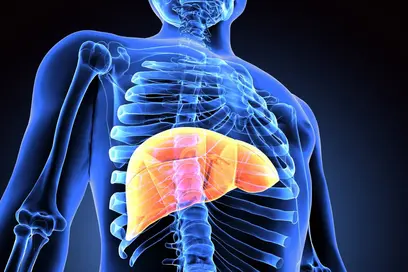It is not so long ago that microRNAs were discovered. Only a couple of years ago scientists found out how these tiny molecules - short transcripts of the hereditary substance, DNA - take part in the regulation of life in a cell: They bind to other DNA transcripts that are necessary for the production of proteins. The binding of microRNA leads to blocking or even degradation of these protein building instructions, before these can even be used for protein production. In this way, the cell controls the type and amount of proteins produced.
If this natural self-control of the cell is overactive, it can also cause damage by blocking the production of useful proteins. This is exactly what happens to the Pdcd4 protein in colorectal cancer cells, as reported in a recent study by the Clinical Cooperation Unit “Molecular Oncology of Solid Tumors“ of the German Cancer Research Center (Deutsches Krebsforschungszentrum, DKFZ). Pdcd4 is what is called a tumor suppressor: It protects cells from transforming into cancer cells. If the substance disappears from a cell, cancer risk increases. A research team headed by Dr. Heike Allgayer has found out that the microRNA miR-21 in colorectal cancer cells suppresses the production of Pdcd4.
Studying ten different types of colorectal cancer cells, the team found out: The more miR-21 was present in the cells, the less Pdcd4 they produced. When the scientists switched off part of the miR-21 present, Pdcd4 levels in the cells rose. At the same time, cancer-typical characteristics of the cells also became weaker when more tumor protection protein was present. Thus, invasive growth capacity was significantly reduced and the cells formed fewer metastases in natural tissue. If, however, the researchers treated the cells with additional miR-21, the effects were exactly opposite.
The researchers were also able to identify the target for miR-21 on the building instruction of the Pdcd4 protein. To this end, the corresponding region of the Pdcd4 gene was inserted into an artificial gene construct. This gene construct was all the more active, the less miR-21 was present. Following a small genetic modification at the target, miR-21 no longer had an influence.
Irfan Asangani, Kabeer Rasheed, Dessislava Nikolova, Joerg Leupold, Nancy Colburn, Stefan Post, Heike Allgayer: MicroRNA-21 (miR-21) post-transcriptionally downregulates tumor suppressor Pdcd4 and stimulates invasion, intravasation and metastasis in colorectal cancer. Oncogene 2007. DOI: 10.1038/sj.onc.1210856
About DKFZ
With more than 3,000 employees, the German Cancer Research Center (Deutsches Krebsforschungszentrum, DKFZ) is Germany’s largest biomedical research institute. DKFZ scientists identify cancer risk factors, investigate how cancer progresses and develop new cancer prevention strategies. They are also developing new methods to diagnose tumors more precisely and treat cancer patients more successfully. The DKFZ's Cancer Information Service (KID) provides patients, interested citizens and experts with individual answers to questions relating to cancer.
To transfer promising approaches from cancer research to the clinic and thus improve the prognosis of cancer patients, the DKFZ cooperates with excellent research institutions and university hospitals throughout Germany:
- National Center for Tumor Diseases (NCT, 6 sites)
- German Cancer Consortium (DKTK, 8 sites)
- Hopp Children's Cancer Center (KiTZ) Heidelberg
- Helmholtz Institute for Translational Oncology (HI-TRON Mainz) - A Helmholtz Institute of the DKFZ
- DKFZ-Hector Cancer Institute at the University Medical Center Mannheim
- National Cancer Prevention Center (jointly with German Cancer Aid)
The DKFZ is 90 percent financed by the Federal Ministry of Research, Technology and Space and 10 percent by the state of Baden-Württemberg. The DKFZ is a member of the Helmholtz Association of German Research Centers.


